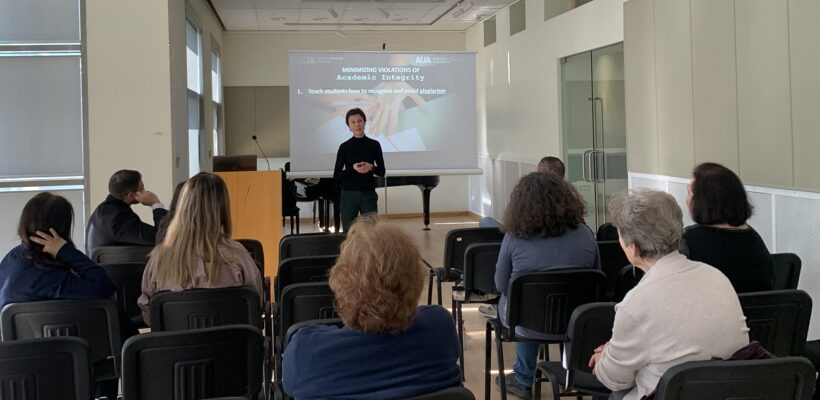
AUA Center for Teaching and Learning Discusses Academic Integrity
3 min readYEREVAN, Armenia — On November 15, the Center for Teaching and Learning (CTL) of the American University of Armenia (AUA) held a professional development event on the topic of “Academic Integrity.” The discussants were Dr. Elitza Kotzeva, assistant professor at the College of Humanities & Social Sciences (CHSS); Director of the Office of Institutional Research and Assessment (OIRA) and CTL Dr. Brent A. Anders; and Suzan Sahakyan, assessment coordinator for OIRA and CTL. In turn, they jointly addressed the elements of academic integrity as a responsibility shared by both students and faculty and proposed ways to prevent incidents of academic dishonesty.
Dr. Anders and Sahakyan opened the presentation by defining academic integrity and explaining what constitutes a violation that would be classified as academic dishonesty or misconduct. Duly referring to the AUA Student Code of Ethics, their presentation focused on policy number 10, which cites the definition of academic dishonesty as “Any action or attempted action that may result in creating an unfair academic advantage for oneself or an unfair academic advantage or disadvantage for any other member or members of the academic community, including misrepresentation of another’s work as one’s own.”
Dr. Anders and Sahakyan then elaborated on the reasons why students commit academic dishonesty, drawing from learning science research across different fields. Sahakyan focused on specific actions that faculty could take to help prevent or decrease incidents of academic dishonesty. She articulated three ways to accomplish this within a course. First, instructors should ensure that they have a proper student assessment structure to help students track their cognitive development through timely feedback from instructors and put in consistent effort throughout the course instead of just focusing on one or two “high-stakes” tests. Secondly, the presenters suggested tips for improving the evaluation procedure by having multiple versions of tests, using different question types, proper monitoring of students during tests, rearranging questions and answers, and using more personalized assignments. Lastly, instructors should discuss and ensure that students are fully aware that academic dishonesty would not be tolerated and constitutes academic misconduct.
Dr. Kotzeva covered the final segment of the presentation which specifically focused on plagiarism. She defined plagiarism as “using others’ ideas and words without clearly acknowledging the source of that information.” She further emphasized that “… you must give credit whenever you use: another person’s idea, opinion, or theory, any facts, statistics, graphs, drawings — any pieces of information — that are not common knowledge, quotations of another person’s actual spoken or written words, or paraphrase of another person’s spoken or written words.” Dr. Kotzeva then covered ways to teach students how to recognize and avoid plagiarism and design assignments that prevent plagiarism.
After the presentation, when asked about her thoughts on academic integrity at AUA, Dr. Kotzeva noted: “The academic success of students in our classes depends largely on us, the faculty, and specifically our careful course design. As instructors, we are responsible to teach them how to distinguish between ethical and unethical academic practices and help them develop skills to read and think critically, write independently, and properly reference the ideas of others. Ultimately, to discourage plagiarism and create a learning environment conducive to success in our classes, we need to coach students through each step of the research process.”
Dr. Brian Ellison, AUA provost and professor of political science, commented following the presentation, “There’s nothing more important to the development of students in higher education than the maintenance of academic integrity.” Provost Ellison went on to explain that the University is always working on ways to enhance its tools and processes to address the issue in an effort to help both students as well as Armenia succeed.
Dr. Anders added: “The Center for Teaching and Learning is committed to supporting the University and faculty specifically in improving techniques and processes that produce the best educational experience possible for all students. Creating a scholarly environment, free of academic dishonesty, is an important part of that.”
Handouts and other resources from the presentation are available on the CTL website. CTL will continue to develop additional academic integrity tools (videos, guides, games, etc.) for instructors and students at AUA and the broader community.
The Center for Teaching and Learning (CTL) of the American University of Armenia (AUA) supports faculty to inspire, cultivate, and continuously enhance the educational process and student experience through research-based, creative, pedagogy and instructional design. More information can be found at https://ctl.aua.am and https://www.facebook.com/CTLatAUA
